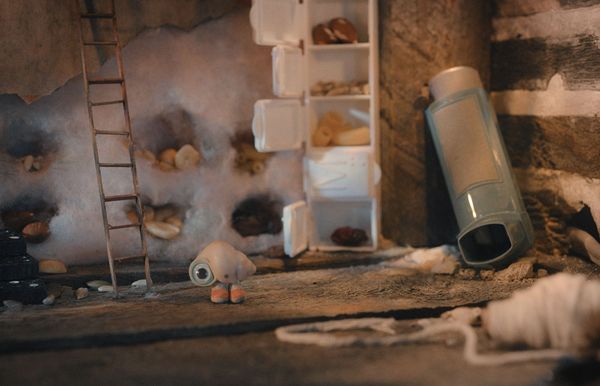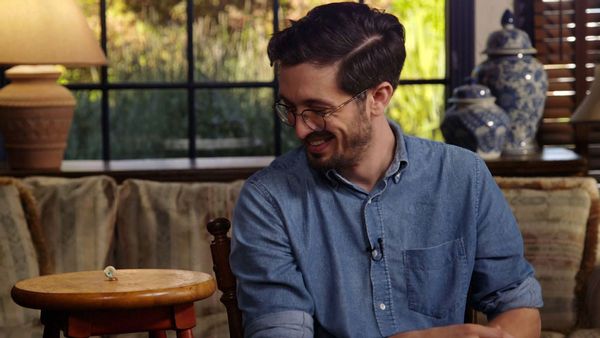
The titular hero of the magical animated fable, "Marcel the Shell with Shoes On" is a 1-inch tall mollusk voiced by Jenny Slate who sleeps in a "bread-room" (e.g, on slices of bread.) Marcel lives in an Airbnb that has been rented by director Dean Fleischer-Camp. (He is also Slate's ex-husband, and writer/director of the shorts the feature is based on.)
Dean is making a documentary about Marcel who has lost his community when the previous human residents (Thomas Mann and Rosa Salazar) left. With only his grandmother, Connie (Isabella Rossellini) remaining, Marcel deals with his fears — a dog, a squirrel — but also combats loneliness as he has lost his friends and family. As Dean films Marcel, he becomes an internet sensation, and even attracts the attention of a producer at "60 Minutes."
But what makes this minimalist film so precious is Marcel's childlike qualities. He expresses joy at playing taps on a piece of macaroni or admires the lovely smell of dryer sheets. He learns how to make popcorn with a magnifying glass. He also gets carsick during an outdoor excursion with Dean. Slate, who worked on the screenplay and produced, captures Marcel's voice in a way that alternately funny — "Documentary? . . . You lost me," or simple yet profound, "Have you ever eaten a raspberry? What did it taste like?"
RELATED: Jenny Slate is fearlessly silly in first Netflix standup special
"Marcel the Shell with Shoes On" also features poignant observations on change as well as grief and rebirth.
Slate spoke with Salon about Marcel and its tiny hero's big messages.
What do you think is Marcel's appeal? Why is he so inspiring? Is it his optimistic outlook?
" I think it would be bad if Marcel had a giggle. When he does have a laugh, it can sound a little scary to me."
What I detect, and for me, what I think people find inspiring about him, is that he holds a lot of emotions at once. He is not one thing. Marcel is really determined, but he has a lot of sorrow and is working through grief. It's seeing somebody trying to move through that while not asking life to stop. He's still trying to have a good life. That's one of the first things he says. You can say that's his optimism, but he's not a blind optimist. He is pretty real, and still chooses to be moving forward.

You've voiced several animated characters in your career. How did you find Marcel's "voice"? It's childlike and it's curious. How did you give his voice personality?
You give an improviser a weird hat and they decide what person is wearing that hat — who that character is. When I started doing the voice, a lot just seemed to fall into place. I can only say that the more I talked, and the more Dean asked me things, the more I knew how to answer him. Things started to make us laugh, so we pressed on that note again. It is one of those moments that is actually how inspiration happens. You are inspired to be this thing. I wish I had a better answer. It was not a calculation on my end. It was just being open and wanting to have fun and genuinely liking the way the voice sounded. The way I want to hear the xylophone more. I just happen to be the human instrument.
His laugh is really distinctive. Can you talk about developing that?
His laugh is a really good example. I think it would be bad if Marcel had a giggle. When he does have a laugh, it can sound a little scary to me. I liked that for the most part his laugh is kind of breathy. [Slate demonstrates.] It's gentle and sounds like little slips of sound coming out. Sometimes you are hearing a new, instantly created element of who he is with something that already exists. How do you give a laugh that doesn't sound creepy and make his situation feel creepy? How do you add something into an existing environment without disturbing it?
What about collaborating on the screenplay? How much of your dialogue was scripted to a plot point, given the mockumentary style, and how much was improvised in the moment?
"All the options that can occur in life often happen simultaneously. Sometimes that is heartbreaking, like when Marcel is looking out window and saying, 'If I was somebody else, I would be enjoying this right now.'"
Dean and I wrote out a very extensive treatment — like 40 pages or maybe 70 — it said what we thought the whole movie would be. We improvised off of that treatment, and brought Isabella into that initial process. Then Dean and our cowriter, Nick Paley went through hours of audio and reduced it down to a streamlined audio play. We thought this was going to be the plot, but then we thought, "This moment doesn't really work . . ." Listening to it, we eliminated one storyline and brought this other one into the center of it. Dean and Nick would write new outlines and scenes, and Isabella and I would record them word for word and improvise off of those scenes and leave room to see what came up. Dean and Nick would go through the process quite a few times until we locked the audio.
The film is full of simple, profound messages about kindness and compassion, such as "I smile a lot because it is worth it." But there are also messages about change, grief, and rebirth as well as divorce and the separation of/from family. Can you talk balancing the emotions? The film is light but deep.
It feels light because of the tone of the documentary itself. I feel that's Dean's power. He's able to let a lot exist at once. I remember being at my grandfather's funeral and someone ate a huge strawberry an inch away from my face while telling me that my grandfather was a great person. I just remember thinking this is so absurd and inappropriate to be eating this fruit so close to my face. Why didn't you wait to eat it until after you talked to me? It was a funny moment, and my sisters and I were laughing rather than thinking it is so inappropriate to laugh after our grandfather died. We are allowed to still be alive. [My grandfather] would also think that's funny.
"Marcel, who is innocent and ignorant of the internet ... says, 'It's kind of nothing.'"
We wanted to say [with "Marcel"] that life and all the options that can occur in life often happen simultaneously. Sometimes that is heartbreaking, like when Marcel is looking out window and saying, "If I was somebody else, I would be enjoying this right now." Sometimes we are put in a painful juxtaposition of what we would like to be included in, and sometimes we are so miraculously included in everything that is occurring. It was what we felt was natural to show. Marcel is a combination of who I am as a person and an artist and who Dean is. We just offered what we had.

I really liked the pointed comment Marcel makes when he discovers he is an online sensation. He describes social media as an audience, not a community. What are your thoughts about social media and connection? Surely social media success helped "Marcel" develop from the short to the feature and will help it gain an audience, so it is a double-edged sword.
There are many advantages and disadvantages, many rewards and many disappointments. I've come to accept that. Personally, I don't want to rely on the internet anymore to give me my sense of being important, or powerful, or special. I can't hold on to that. I like taking a character like Marcel, who is innocent and ignorant of the internet, and showing him how it works, and he says, "It's kind of nothing." He never asked to be famous or knew there was a possibility of getting something out of internet. He does not feel ashamed or ungrateful to say, "There is kind of a lot of nothing on here." We make a really unadorned comment that a lot of the behavior does not make sense. If someone is asking for help, how do you not see that? He is pointedly asking for assistance, and they say, "You're cute." It's such a weird thing. If someone is pounding on your door saying "I need help. I can't find my mom," you don't respond, "Cute outfit!" The disconnection is so profound, and it is occurring, and it is real. We are not trying to shame anybody. We are just trying to gently call out this weird thing that is happening to all of us. Sometimes we are the people doing it, and sometimes it is being done to us. It is worth being aware of. When you are aware of it, you can decide what to do with it.
Want a daily wrap-up of all the news and commentary Salon has to offer? Subscribe to our morning newsletter, Crash Course.
I loved the scenes of Marcel "screaming it out." Do you do that to release your anger — not that I can imagine you ever getting angry.
[Laughs] I do get angry. At this point, I am usually only angry at someone I expect a lot from. I like to have long, long, long conversations where I can say, "I am angry, but I don't want to be disrespectful, but I am very, very angry right now." I understand having to make a noise to burn off a feeling. I've done my fair share of screaming in a car with the windows up.
The documentary is meant to show the "truth about Marcel." What for you is Marcel's truth?
He's a really, really cool person. [Laughs.] I think everything about him, even when he fails and has attitude, the truth is he is who is he and it feel so, so, so good.
"Marcel the Shell with Shoes On" hits theaters Friday, June 24. Watch a trailer via YouTube.
More stories to check out:







